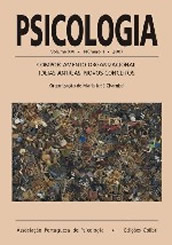Experiência prévia e eficácia grupal percebida perante dilemas sociais
DOI:
https://doi.org/10.17575/rpsicol.v21i1.358Palavras-chave:
-Resumo
Actualmente, as organizações geram numerosas situações de interdependência nas quais os indivíduos procuram maximizar os seus benefícios pessoais em detrimento do colectivo a que pertencem. Os contextos que fomentam a competição fazem com que as pessoas tenham que enfrentar dilemas sociais semelhantes aos que se abordam em outras ciências, como a economia, a evolução, os estudos de populações, o meio ambiente, a ecologia e o desenho urbanístico. Por esta razão, os investigadores denominaram o estudo deste tipo de comportamento como a Psicologia do Compartir. Quando um grupo de pessoas tem de compartir um número limitado de recursos, existe uma tendência para actuar de uma maneira auto-suficiente, mesmo sabendo que a cooperação mútua poderia levar a um benefício para mais pessoas. Neste estudo pretendemos analisar algumas variáveis que ajudam a construir um sentimento de cooperação perante dilemas sociais. Numa amostra de 108 estudantes universitários (distribuídos em 36 grupos) que participaram na resolução de diferentes tarefas de negociação e tomada de decisão, ao longo de vários meses de trabalho em equipa, avaliámos os processos de auto-regulação do grupo (eficácia grupal percebida, metas grupais, estado afectivo grupal). Posteriormente, pedimos a cada grupo que resolvesse uma tarefa de dilema social: the tragedy of the commons. Numa primeira fase, as equipas deviam resolver a tarefa num contexto virtual. Numa segunda fase, cada membro do grupo devia mostrar as suas escolhas ao resto dos companheiros durante várias decisões consecutivas. Os resultados mostraram que aqueles indivíduos cujos grupos desenvolvem um estratégia inicial de cooperação e mantêm um juízo elevado de eficácia grupal percebida tomam decisões de forma cooperativa. Estes resultados trazem novos desenvolvimentos para a intervenção para enfrentar situações de competição e dilemas sociais: construir programas de formação que facilitem situações de cooperação para gerar eficácia grupal e melhorar o desempenho.


